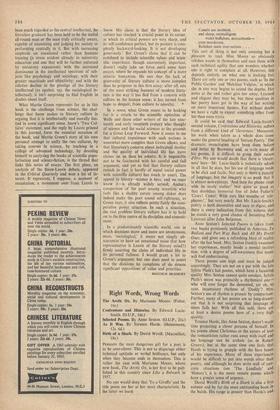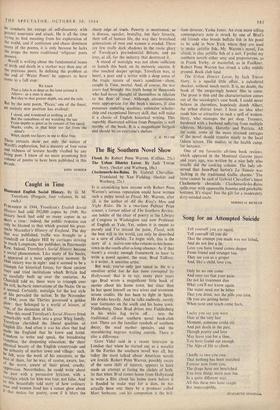Right Words, Wrong Words
Birth of a Shark. By David Wevill. (Macmillan, 18s.)
PERHAPS the most dangerous gift for a poet is to be over-clever. This is not to disparage either technical aptipde or verbal brilliance, but only when they become ends in themselves. This is rather the case with Marianne Moore, whose new book, The Arctic Ox, is her first to be pub- lished in this country since Like a Bulwark in 1957.
No ope would deny that 'To a Giraffe' and the title poem see her at her most characteristic. In the latter we learn Camels are snobbish and sheep, unintelligent; water buffaloes, neurasthenic— even murderous.
Reindeer seem over-serious . .
This sort of thing is not only amusing but a pleasure to read. Miss Moore so obviously relishes words in themselves and uses them with such technical agility that one wonders whether one is right tb complain at all. However, this depends entirely on what one is looking for. There are only one or two poems, such as 'In the Public Garden' and 'Melchior Vulpius,' in which she in any way begins to sound the depths. Her notes at the end rather give her away. Learned and elegant they may be, but these qualities in her poetry have got in the way of her writing' on more important themes. For without doubt we have a right to expect something other from her than mere trivia.
It could be said that Edward Lucie-Smith's second volume, Confessions and Histories, suffers from a different kind of 'cleverness.' Moreover, his work when taken as a whole does come under the general heading of 'Instant Poetry.' The dramatic monologues have been done before' and better by Browning and, as with many Of his poems, it is difficult to grasp their raison d'etre. No one would doubt that there is 'clever ness' here—Mr. Lucie-Smith is technically adroit, in all that he does, but his use of language tends to be slick and facile. Not only is there a paucity of language, but the imagery is so weak that it is almost non-existent. 'And then the phone rings with its steely stutter.' Not quite as good as that doubtless immortal line of John Fuller's,' 'Cows! Cows! With ears like mouths of tele- phones!,' but very nearly. But Mr. Lucie-Smith's poetry is both decorative and easy to digest, and, there is every indication from this volume that' he stands a very good chance of becoming Poetl Laureate after John Betjeman.
Anne Sexton's Selected Poems is taken front, two books previously published in America, To Bedlam and Part Way Back and All My Pretty, Ones, and gives one a refreshing blast of realitY, after the last book. Mrs. Sexton frankly examines' her experiences, mostly inside a mental institu-A tion, with a degree of self-awareness that many will find embarrassing.
These poems aim high and must be judged accordingly. They are not on a par with the late Sylvia Plath's last poems, which have a haunting quality Mrs. Sexton cannot quite emulate. Sylvia. Plath's secret was primarily a rhythmical one-- who will ever forget the demented, yet oh, so sane, incantatory rhythms of 'Daddy'? Mrs. Sexton's use of rhythm is prosaic by comparison, Further, many of her poems are so long-drawn- out that it is not surprising that language at times fails her. With all this said, there are at least a dozen poems here of a very high quality.
Terence Hards, like Anne Sexton, doesn't waste time projecting a clever persona of himself. In his poems about Christmas or the nature of love the romanticism rather runs away with itself and his language can be archaic (as in Robert Graves), but at the same time one feels that Hards is trying to grapple with the bare bones of his experience. Many of these experiences would be difficult to put into words other than poetry, and although he does write well of con' crete situations (see 'The Landlady' and 'Hansey'), it is the more remote poems which have a greater sense of urgency.
David Wevill's Birth of a Shark is also a first volume and by far the most outstanding book in the batch. His range is greater than Hards's and
he conducts his voyage of self-discovery with greater assurance and attack. He is all the time trying to find meaning from his exploration of the world, and if confusion and chaos dominate many of the poems, it is only because he lacks the props the more traditional 'religious' poets possess.
Wevill is writing about the fundamental issues or birth and death in a starker way than any of the previous poets. In defining the problem at the end of `Water Poem' he appears to have Come to a full stop:
We knew That a lake is as deep as the land around it Allows: as a man is deep, But dies to that greater depth, sea and the rain.
But by the next poem, 'Pisces,' one of the finest, an entirely new position has evolved:
I stood, and wondered at nothing at all
But the casualness of my watching the sea From depths as great as its cancers of live squid, Sharks, crabs, at that hour too far from the mind's
Whet; depth too heavy in me to float free.
These extracts show not only the nature of Wevill's exploration, but a mastery of free verse and richness of texture hardly rivalled by any living poet. I know of no more promising first volume of poems to have been published in this decade.
JOHN liORDER



































 Previous page
Previous page